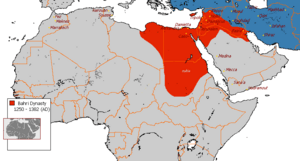Bahri dynasty facts for kids

The Bahri dynasty or Bahriyya Mamluks was a group of rulers, mostly from Cuman-Kipchak Turkic backgrounds. They ruled the Egyptian Mamluk Sultanate from 1250 to 1382. This dynasty came after the Ayyubid dynasty and was followed by another Mamluk dynasty called the Burji dynasty.
The name "Bahriyya" means 'of the river'. This name came from where they first settled. They lived on Al-Rodah Island in the Nile River (Nahr al-Nil) in Medieval Cairo. Their castle on Al-Rodah Island was built by the Ayyubid Sultan as-Salih Ayyub.
Contents
History of the Bahri Dynasty
The Mamluks built one of the most powerful and richest empires of their time. It lasted from 1250 to 1517. Their empire covered Egypt, North Africa, and the Levant (which is part of the Near East).
The End of the Bahri Rule
After a while, the leaders (sultans) changed very often. This caused a lot of problems and confusion in the different areas they ruled. Also, in 1349, a terrible sickness called the Black Death spread through Egypt and the Levant. Many people sadly died because of it.
In 1382, the last Bahri Sultan, Hajji II, was removed from power. A Circassian leader named Barquq took over the Sultanate. He was forced out in 1389 but came back to power in 1390. This started the next dynasty, the Burji dynasty.
How the Bahri Military Worked
The military during the Bahri dynasty had different parts.
- Mamluks: These were the main soldiers and the most important group. They were slave soldiers who were trained to be loyal fighters.
- Khassaki: These were like special guards for the Sultan.
- Royal Mamluks: These soldiers worked directly for the Sultan.
- Regular Mamluks: These were usually assigned to local leaders called Amirs.
- Al-Halqa: These were professional soldiers who were born free. They also worked directly for the Sultan.
- Wafidiyya: These were Turks and Mongols who moved to the Mamluk lands after the Mongol invasions. They were given land if they agreed to serve in the military. They were known as very good fighters.
- Other groups: These included Bedouin tribes and sometimes groups of Turkomans and other settled Arabs. They also helped in the military when needed.
List of Bahri Sultans
Here is a list of the sultans who ruled during the Bahri dynasty:
| Royal Name | Personal Name | Years Ruled |
|---|---|---|
| al-Malikah Ismat ad-Din Umm-Khalil الملکہ عصمہ الدین أم خلیل |
Shajar al-Durr شجر الدر |
1250–1250 |
| al-Malik al-Mu'izz Izz al-Din Aybak al-Jawshangir al-Turkmani al-Salihi الملک المعز عز الدین أیبک الترکمانی الجاشنکیر الصالحی |
Izz-ad-Din Aybak عز الدین أیبک |
1250–1257 |
| Sultan Al-Ashraf سلطان الاشرف |
Muzaffar-ad-Din Musa مظفر الدین موسی |
1250–1252 |
| Sultan Al-Mansur سلطان المنصور |
Nur ad-Din Ali نور الدین علی |
1257–1259 |
| Sultan Al-Muzaffar سلطان المظفر |
Sayf ad-Din Qutuz سیف الدین قطز |
1259–1260 |
| Sultan Abul-Futuh – سلطان ابو الفتوح Al-Zahir - الظاہر Al-Bunduqdari - البندقداری |
Rukn-ad-Din Baibars I رکن الدین بیبرس |
1260–1277 |
| Sultan Al-Sa'id Nasir-ad-Din سلطان السعید ناصر الدین |
Muhammad Barakah Khan محمد برکہ خان |
1277–1279 |
| Sultan Al-Adil سلطان العادل |
Badr-al-Din Solamish بدر الدین سُلامش |
1279 |
| Al-Mansur – المنصور Al-Alfi - الالفی As-Salehi - الصالحی |
Sayf-ad-Din Qalawun سیف الدین قلاوون |
1279–1290 |
| Sultan Al-Ashraf سلطان الاشرف |
Salah-ad-Din Khalil صلاح الدین خلیل |
1290–1293 |
| Al-Nasir الناصر |
Nasir-ad-Din Muhammad ناصر الدین محمد |
1293–1294 (first reign) |
| Al-Adil Al-Turki Al-Mughli العادل الترکی المغلی |
Zayn-ad-Din Kitbugha زین الدین کتبغا |
1294–1297 |
| Al-Mansur المنصور |
Husam-ad-Din Lachin حسام الدین لاچین |
1297–1299 |
| Al-Nasir الناصر |
Nasir-ad-Din Muhammad ناصر الدین محمد |
1299–1309 (Second reign) |
| Sultan Al-Muzaffar Al-Jashankir سلطان المظفرالجاشنکیر |
Rukn-ad-Din Baibars II رکن الدین بیبرس |
1309 |
| Al-Nasir الناصر |
Nasir-ad-Din Muhammad ناصر الدین محمد |
1309–1340 (Third reign) |
| Al-Mansur المنصور |
Sayf-ad-Din Abu-Bakr سیف الدین أبو بکر |
1340–1341 |
| Al-Ashraf الأشرف |
Ala-ad-Din Kujuk علاء الدین کجک |
1341–1342 |
| Sultan Al-Nasir سلطان الناصر |
Shihab-ad-Din Ahmad شھاب الدین أحمد |
1342 |
| Sultan As-Saleh سلطان الصالح |
Imad-ad-Din Ismail عماد الدین إسماعیل |
1342–1345 |
| Sultan Al-Kamil سلطان الکامل |
Sayf-ad-Din Shaban I سیف الدین شعبان اول |
1345–1346 |
| Sultan Al-Muzaffar سultan Al-Muzaffar |
Sayf-ad-Din Hajji I سیف الدین حاجی اول |
1346–1347 |
| Al-Nasir Abu Al-Ma'ali الناصر أبو المعالی |
Badr-ad-Din Al-Hasan بدر الدین الحسن |
1347–1351 (first reign) |
| Sultan As-Saleh سلطان الصالح |
Salah-ad-Din bin Muhammad صلاح الدین بن محمد |
1351–1354 |
| Al-Nasir Abu Al-Ma'ali Nasir-ad-Din الناصر أبو المعالی ناصر الدین |
Badr-ad-Din Al-Hasan بدر الدین الحسن |
1354–1361 (second reign) |
| Al-Mansur المنصور |
Salah-ad-Din Muhammad صلاح الدین محمد |
1361–1363 |
| Al-Ashraf Abu Al-Ma'ali الأشرف أبو المعالی |
Zayn-ad-Din Shaban II زین الدین شعبان ثانی |
1363–1376 |
| Al-Mansur المنصور |
Ala-ad-Din Ali علاء الدین علی |
1376–1382 |
| Sultan As-Saleh سلطان الصالح |
Salah-ad-Din Hajji II صلاح الدین حاجی ثانی |
1382 (first reign) |
| Al-Zahir الظاہر |
Sayf-ad-Din Barquq سیف الدین برقوق |
1382–1389 |
| Sultan As-Saleh سلطان الصالح المظفر المنصور |
Salah-ad-Din Hajji II صلاح الدین حاجی ثانی |
1389 (second reign) |
After Sultan As-Saleh, the Burji dynasty took control of the Mamluk Sultanate. This happened under Sayf-ad-Din Barquq in 1389–90 C.E.
See also

- In Spanish: Dinastía bahrí para niños
 | Aaron Henry |
 | T. R. M. Howard |
 | Jesse Jackson |

